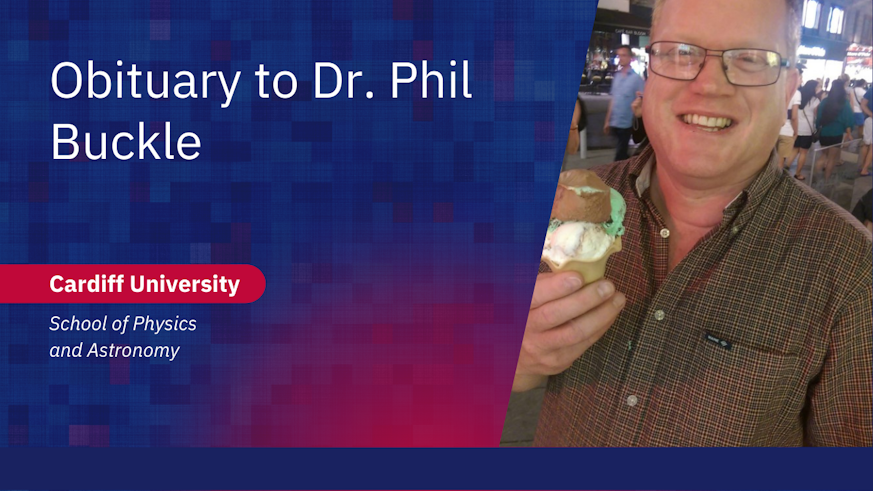Obituary to Dr. Phil Buckle
16 July 2021

It is with a heavy heart, but great fondness that we mourn the death of our friend Phil Buckle. A man whose radiant energy filled our school of Physics and Astronomy and which he used as a method to inspire all, in his joy of teaching and research.
Phil began his research career in Sheffield where he completed both his undergraduate degree and his PhD, despite spending some significant time rock climbing. His enthusiasm for physics and love of life in general guided him through his postgraduate studies where he helped to solidify a newly formed group, with his contribution to the understanding of a double barrier resonant tunnelling structure. Clearly relishing the challenge, Phil then took up a position in Manchester as a PDRA working on triple barrier resonant tunnelling structures. Already, he was the go-to person for advice or just for comfort when things did not quite work out – we are reliably informed that his door was open to everyone from fresh faced PhD students to the occasional grumpy old Professor.
In 1998 Phil moved to the Defence Evaluation and Research Agency at Malvern to join the Novel Devices team, where he stayed during the transition to QinetiQ. Phil’s research turned to the investigation of the quantum applications of narrow band-gap semiconductors, where his work was extensive: he developed novel models to describe the leakage in Schottky gates to AlInSb/InSb quantum wells; he demonstrated the first Coulomb blockade resonances in surface-gated InSb devices; he demonstrated zero-field spin-splitting and giant enhanced g-factors in InSb quantum wells; he also proved the potential for these devices in THz detection. His research interests extended to investigating the feasibility of molecular electronics combined with single electron transistors, for applications such as chemical sensing. All this success led to him being promoted to QinetiQ Fellow, one of only approximately one hundred in an organisation employing about six thousand scientists and engineers, he also became a visiting Professor at Manchester University.
Whilst at QinetiQ, Phil was instrumental in developing the business plan for a Quantum Technology Partnership, which following his move to Cardiff in 2011, joined with the broader vision for a semiconductor fabrication facility which would not only carry out its own research but also provide research and fabrication services to industry. Phil was integral in shaping and refining the goals and strategy of the newly formed Institute for Compound Semiconductors; it was during this process that his excellent communications skills became clear to the new community at Cardiff.
At Cardiff it was Phil’s ability to communicate, both “chatting” and listening that drew us all close to him. His dedication to teaching through detail and humour was wonderful to witness. He imparted his experimental expertise in the undergraduate lab and his physics understanding through his lecture courses. Phil was consistently in the top tier for his student satisfaction ratings – even after setting some rather tricky exams. Phil supervised many PhD students during his time at both QinetiQ and Cardiff and it is reassuring to know that his expertise will live on through those he taught and who continue to work in research.
We will all remember Phil’s bellowing laughter and his strict adherence to his lunch hour. His views on English rugby, formed through a playing experience with a certain Martin Johnson, did not generate universal respect in South Wales, but somehow he could carry that off with all those (and he brought it up with everyone) that he met. Phil’s reputation for easy friendship and a willingness to share knowledge on every topic spanned students, their parents, our staff and those with whom he shared his daily train commute!
We would like to thank all of those who shared memories of Phil with us. We trust that in future a slice of cake washed down with a chocolate milkshake will be sure to bring the great memories of a respected colleague and a valued friend flooding back.
We extend our heartfelt condolences to Phil’s wife, Lou, and to his children, Georgia, Ellie and Tom.
Phil benefitted so much in his lifetime from advances in treatments to tackle cancer and his family have set up a Cancer Research just giving page in his memory.
For those wishing to leave a personal message we encourage you to contribute to an online condolence book.
All our love,
Cardiff University School of Physics and Astronomy.